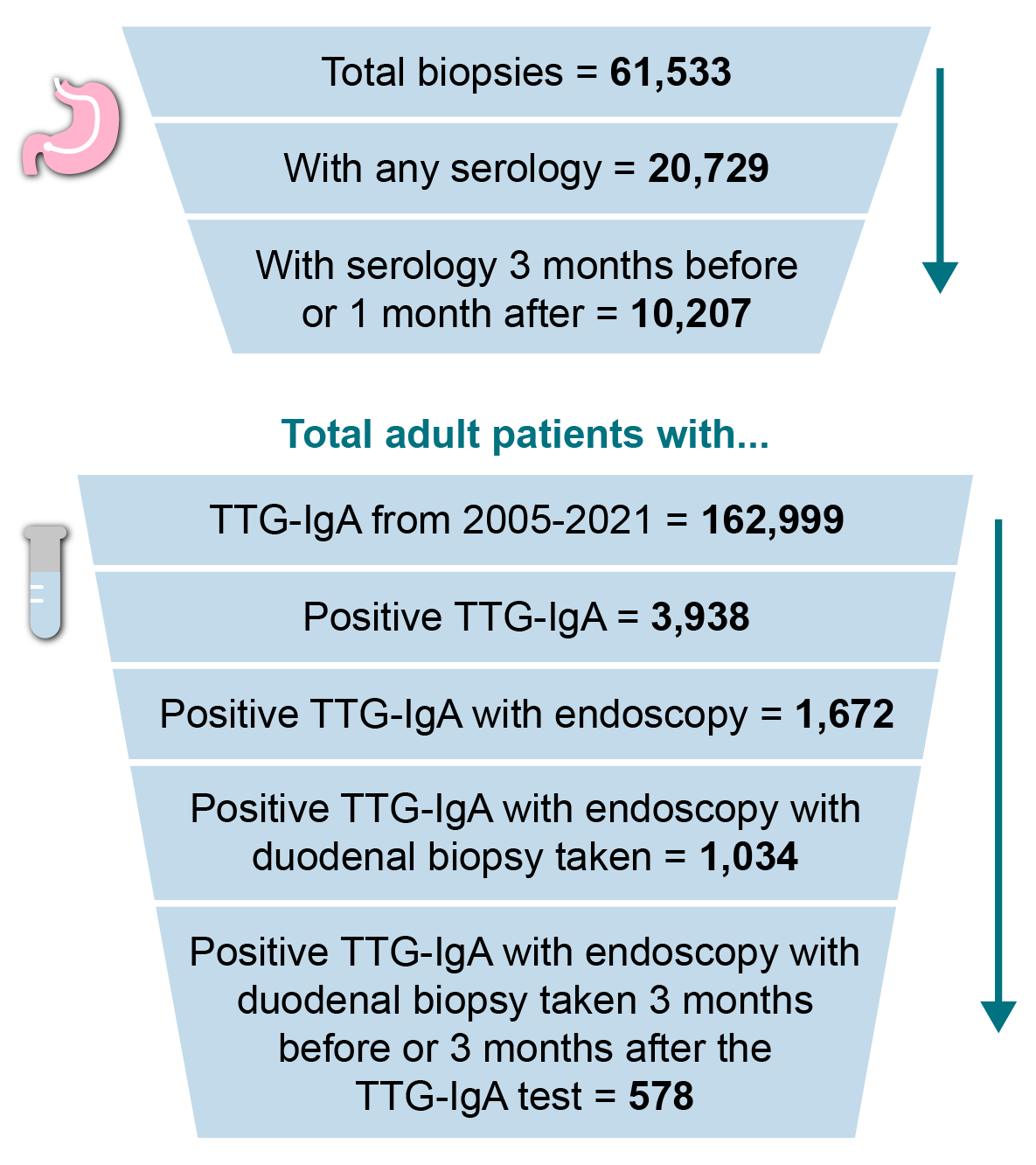Monday Poster Session
Category: Small Intestine
P4028 - Falling Through the Cracks: Many Patients With Incomplete Celiac Disease Evaluations
Monday, October 27, 2025
10:30 AM - 4:00 PM PDT
Location: Exhibit Hall

Claire Jansson-Knodell, MD
Cleveland Clinic Foundation
Cleveland, OH
Presenting Author(s)
Claire Jansson-Knodell, MD1, Elizabeth Dewey, BS1, Kathryn Martinez, PhD, MPH1, Adam Perzynski, PhD2, Jarrod Dalton, PhD1, Alberto Rubio Tapia, MD1
1Cleveland Clinic Foundation, Cleveland, OH; 2Case Western Reserve University, Cleveland, OH
Introduction: Tissue transglutaminase antibody testing (TTG-IgA) combined with duodenal histopathology is the guideline recommendation for celiac disease evaluation. To ensure accurate testing, patients must continue consuming gluten during diagnostic evaluation, otherwise TTG-IgA antibodies will decline, and biopsies will normalize. It is unknown how many patients stop the diagnostic workup prematurely. The aim of this study was to determine how often patients who begin testing for celiac disease complete the diagnostic evaluation.
Methods: We performed a retrospective review of patients undergoing celiac disease testing from 2005-2021 at our institution. Adults ≥ 18 were included who had a TTG-IgA serology test or a duodenal biopsy performed. Workup completion was tracked based on test order. For statistical analysis, Chi-squared test was used for comparison of proportions to analyze workup completion.
Results: During the study period, 61,533 patients had duodenal biopsies [Figure 1]. Only 33.7% of those patients who had duodenal biopsy had antibody testing for celiac disease. Of those patients who received TTG-IgA antibody testing, only 49.2% had it done in proximity to their biopsy for timely clinical information.
In total 162,999 patients had TTG-IgA antibody testing in the study period. The incidence of a positive TTG-IgA antibody was 2.4%. Of those with a positive TTG-IgA antibody, only 42.5% went on to get an endoscopy. Just 61.8% of those getting the endoscopy had a biopsy of their duodenum; 638 patients with a positive TTG-IgA got an endoscopy but did not have a duodenal biopsy specimen submitted. Of those who had a duodenal biopsy, 55.9% had the biopsy taken in proximity to their antibody testing. In total < 15% of patients with a positive antibody completed a biopsy in a timely fashion.
Patients were more likely to be biopsied if their TTG-IgA antibody was positive (26.3%) versus negative (16.5%) (p< 0.0001). Patients receiving a biopsy first were more likely to complete a timely evaluation (16.6%) versus patients who had a positive TTG-IgA antibody result first (14.7%) (p< 0.002).
Discussion: Many patients are lost to follow up while undergoing celiac disease evaluation. This gap highlights an opportunity to increase workup completion for an accurate and timely celiac disease evaluation. Further research is needed to understand patient, physician, and healthcare organization factors that contribute to poor workup completion rates.

Figure: Figure 1. Flow of Patients in Celiac Disease Evaluation
Disclosures:
Claire Jansson-Knodell: AGA-Takeda Pharmaceuticals – Grant/Research Support. Exact Sciences – Stock-publicly held company(excluding mutual/index funds). Johnson&Johnson – Stock-publicly held company(excluding mutual/index funds). Medtronic – Stock-publicly held company(excluding mutual/index funds). United Health Group – Stock-publicly held company(excluding mutual/index funds).
Elizabeth Dewey indicated no relevant financial relationships.
Kathryn Martinez indicated no relevant financial relationships.
Adam Perzynski indicated no relevant financial relationships.
Jarrod Dalton indicated no relevant financial relationships.
Alberto Rubio Tapia indicated no relevant financial relationships.
Claire Jansson-Knodell, MD1, Elizabeth Dewey, BS1, Kathryn Martinez, PhD, MPH1, Adam Perzynski, PhD2, Jarrod Dalton, PhD1, Alberto Rubio Tapia, MD1. P4028 - Falling Through the Cracks: Many Patients With Incomplete Celiac Disease Evaluations, ACG 2025 Annual Scientific Meeting Abstracts. Phoenix, AZ: American College of Gastroenterology.
1Cleveland Clinic Foundation, Cleveland, OH; 2Case Western Reserve University, Cleveland, OH
Introduction: Tissue transglutaminase antibody testing (TTG-IgA) combined with duodenal histopathology is the guideline recommendation for celiac disease evaluation. To ensure accurate testing, patients must continue consuming gluten during diagnostic evaluation, otherwise TTG-IgA antibodies will decline, and biopsies will normalize. It is unknown how many patients stop the diagnostic workup prematurely. The aim of this study was to determine how often patients who begin testing for celiac disease complete the diagnostic evaluation.
Methods: We performed a retrospective review of patients undergoing celiac disease testing from 2005-2021 at our institution. Adults ≥ 18 were included who had a TTG-IgA serology test or a duodenal biopsy performed. Workup completion was tracked based on test order. For statistical analysis, Chi-squared test was used for comparison of proportions to analyze workup completion.
Results: During the study period, 61,533 patients had duodenal biopsies [Figure 1]. Only 33.7% of those patients who had duodenal biopsy had antibody testing for celiac disease. Of those patients who received TTG-IgA antibody testing, only 49.2% had it done in proximity to their biopsy for timely clinical information.
In total 162,999 patients had TTG-IgA antibody testing in the study period. The incidence of a positive TTG-IgA antibody was 2.4%. Of those with a positive TTG-IgA antibody, only 42.5% went on to get an endoscopy. Just 61.8% of those getting the endoscopy had a biopsy of their duodenum; 638 patients with a positive TTG-IgA got an endoscopy but did not have a duodenal biopsy specimen submitted. Of those who had a duodenal biopsy, 55.9% had the biopsy taken in proximity to their antibody testing. In total < 15% of patients with a positive antibody completed a biopsy in a timely fashion.
Patients were more likely to be biopsied if their TTG-IgA antibody was positive (26.3%) versus negative (16.5%) (p< 0.0001). Patients receiving a biopsy first were more likely to complete a timely evaluation (16.6%) versus patients who had a positive TTG-IgA antibody result first (14.7%) (p< 0.002).
Discussion: Many patients are lost to follow up while undergoing celiac disease evaluation. This gap highlights an opportunity to increase workup completion for an accurate and timely celiac disease evaluation. Further research is needed to understand patient, physician, and healthcare organization factors that contribute to poor workup completion rates.

Figure: Figure 1. Flow of Patients in Celiac Disease Evaluation
Disclosures:
Claire Jansson-Knodell: AGA-Takeda Pharmaceuticals – Grant/Research Support. Exact Sciences – Stock-publicly held company(excluding mutual/index funds). Johnson&Johnson – Stock-publicly held company(excluding mutual/index funds). Medtronic – Stock-publicly held company(excluding mutual/index funds). United Health Group – Stock-publicly held company(excluding mutual/index funds).
Elizabeth Dewey indicated no relevant financial relationships.
Kathryn Martinez indicated no relevant financial relationships.
Adam Perzynski indicated no relevant financial relationships.
Jarrod Dalton indicated no relevant financial relationships.
Alberto Rubio Tapia indicated no relevant financial relationships.
Claire Jansson-Knodell, MD1, Elizabeth Dewey, BS1, Kathryn Martinez, PhD, MPH1, Adam Perzynski, PhD2, Jarrod Dalton, PhD1, Alberto Rubio Tapia, MD1. P4028 - Falling Through the Cracks: Many Patients With Incomplete Celiac Disease Evaluations, ACG 2025 Annual Scientific Meeting Abstracts. Phoenix, AZ: American College of Gastroenterology.
